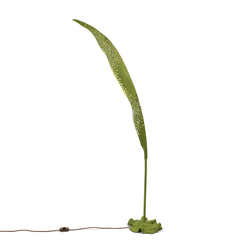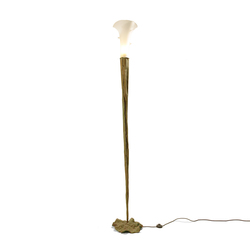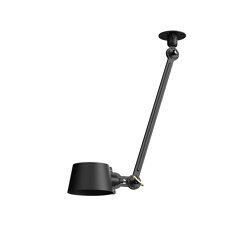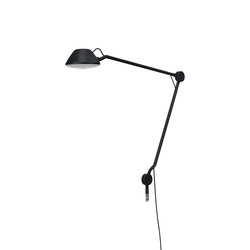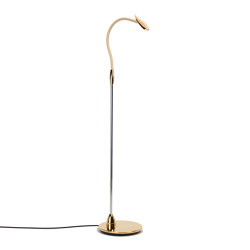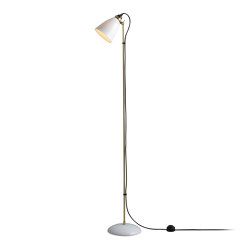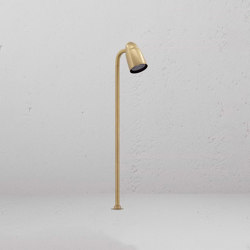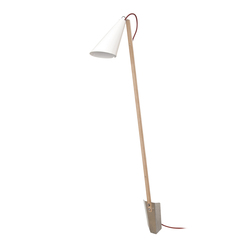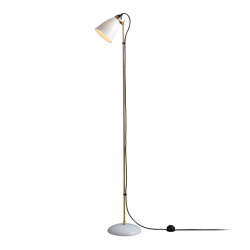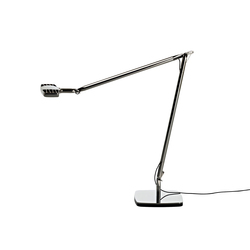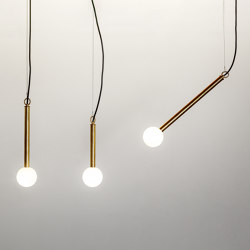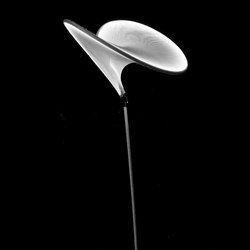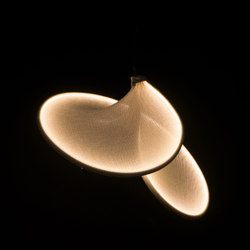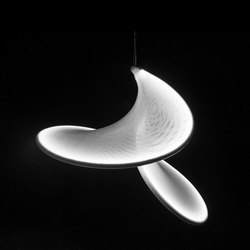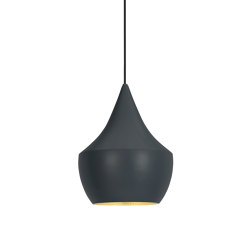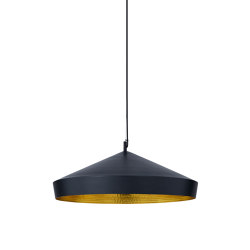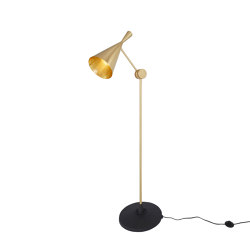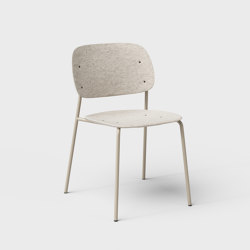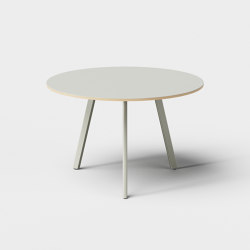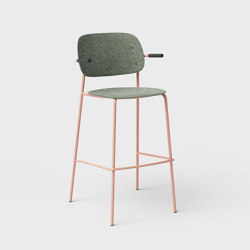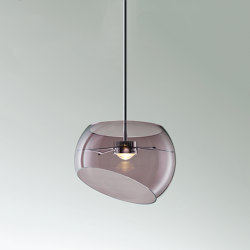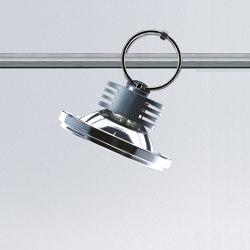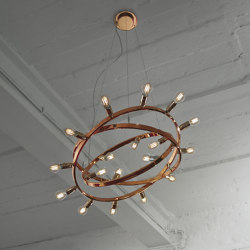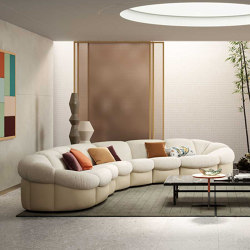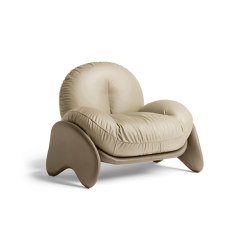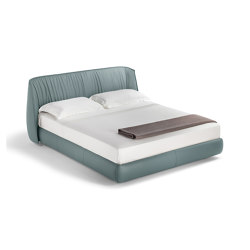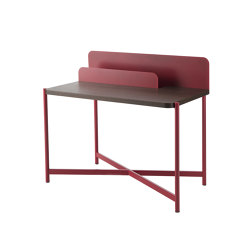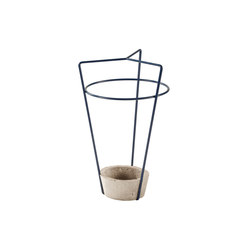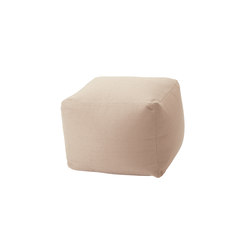Kyet
Free-standing lights from anthologie quartett, Designed by Bohuslav Horak
- Family gallery
- Family gallery
- Family gallery
- Family gallery
- Family gallery
- Family gallery
- Family gallery
Product description
floor lamp
approx. ø 400x1850 mm
iron.patinised.bohemian crystal glass.mouth-blown.sandblasted
1 x 25 W (max. 60 W) clear E27
approx. ø 400x1850 mm
iron.patinised.bohemian crystal glass.mouth-blown.sandblasted
1 x 25 W (max. 60 W) clear E27
Concept
in the 1960s and 1970s, but especially in the 1980s, the country that provided stimuli and formulated style in all fields of design was italy. only at the end of the decade did designers from other (western european) nations begin to move to the forefront, and they asserted themselves with increasing impact among the previous (almost exclusively italian) leading figures in design: via a detour through italy and with the help of italian avantgarde manufacturers, the history of design (at that time still italian) began to be written by english, french, dutch, spanish and german designers.
in 1987, when the general euphoria of design reached its peak, the prague designers’ group ‘atika’ including designer bohuslav horák proved that - seen through the eyes of western europe - there was a certain designing potential behind the iron curtain which still functioned at that time, to be taken into account in the future. the enormous media success of atika was based on two factors: on the one hand the objects of the atika group with their forms, their presentation, and their conception in and itself differed fundamentally from the products of new european avantgarde design, and on the other hand their provenance, at the end of the 1980s still exotic, naturally helped them to achieve this success. photographs of the designs, at that time still provocative, appeared in all european magazines. the first path to the west for members of the atika group was their trip to milan in 1987, but it was not until after the fall of the wall that atika’s actual products made their way into the world of western design: by that time, however, atika was beginning to fall apart, and only one of its members, bohuslav horák, built his success of the atika image. he founded his own studio in 1990.
his ‘autumn leaf’ sofa of 1987 became the most widely-publicized piece of the atika group, and the iron structure of this piece of furniture, which suggests the remnant veins of a faded leaf, have permeated horák’s work since that time like a leitmotiv: it appears dynamically once more in the structure of the garden chair ‘pupeny’ of 1996 and as a major decorative element in the grate called ‘plot’ of 1998. another motive that constantly returns in his work is a metal surface with irregular openings; in the case of ‘greenhorn’ of 1994 (which - let us admit - could be used as a fruit bowl only for large familes) this perforated structure forms a ‘fruit basket’ resting on a small shelf suggesting an effect of deconstruction. the mirror ‘kýc’ from the same year plays with the same perforated pattern in a similarly ironically-conceived picture frame, and in the ceiling light fixtures ‘silueta’ and ‘koral’ this perforated structure produces fascinating lighting effects.
horàk is a master in metal; nobody else can bend, assemble, and weld iron and aluminium pipes and metal plates into new forms the way he does. however, the gentle and creative violence he wreaks on metal with growing mastery is only one aspect of his art, because horák is also a master of surface.
with various color treatments and pigmented layers he changes and enriches the surfaces of his metals and sometimes - with similar mastery - also wooden surfaces. in the end nothing remains as it was; the materials he works with change like a cameleon into other forms, and no fragment resembles another.
horák’s world is as though not from this world. floor lamps mutate into carnivorous plants. from his benches wind tendrils of a metallic grape vine. his mirroirs seem to have been caught by a whirlwind. and his cabinet has the mask of a ginkgo tree. despite all the fantasy and poetry, his furniture, ceiling fixtures, and functional objects function as they should, as a floor lamp, bench, mirror, and cabinet: apart from these natural functions, however, they also tend to create moods, images, fantasies, and dreams while, at the same time, they appear to turn into rather peculiar contemporaries who refreshingly differ from the countless number of more or less scattered dust traps which are obviously intended to feature the alienated art form of present-day design.
together, horák’s objects form a great, fantastic garden of metal, and when one or the other candlestick or sofa are threatened with getting wet, they should simply be moved into an indoor garden ...
each individual object designed by bohuslav horak has been handmade, whereby the finishing touch is given by the designer himself so that each piece is a unique specimen. for this reason, please allow for sizes and colours that deviate from the catalogue illustrations.
in 1987, when the general euphoria of design reached its peak, the prague designers’ group ‘atika’ including designer bohuslav horák proved that - seen through the eyes of western europe - there was a certain designing potential behind the iron curtain which still functioned at that time, to be taken into account in the future. the enormous media success of atika was based on two factors: on the one hand the objects of the atika group with their forms, their presentation, and their conception in and itself differed fundamentally from the products of new european avantgarde design, and on the other hand their provenance, at the end of the 1980s still exotic, naturally helped them to achieve this success. photographs of the designs, at that time still provocative, appeared in all european magazines. the first path to the west for members of the atika group was their trip to milan in 1987, but it was not until after the fall of the wall that atika’s actual products made their way into the world of western design: by that time, however, atika was beginning to fall apart, and only one of its members, bohuslav horák, built his success of the atika image. he founded his own studio in 1990.
his ‘autumn leaf’ sofa of 1987 became the most widely-publicized piece of the atika group, and the iron structure of this piece of furniture, which suggests the remnant veins of a faded leaf, have permeated horák’s work since that time like a leitmotiv: it appears dynamically once more in the structure of the garden chair ‘pupeny’ of 1996 and as a major decorative element in the grate called ‘plot’ of 1998. another motive that constantly returns in his work is a metal surface with irregular openings; in the case of ‘greenhorn’ of 1994 (which - let us admit - could be used as a fruit bowl only for large familes) this perforated structure forms a ‘fruit basket’ resting on a small shelf suggesting an effect of deconstruction. the mirror ‘kýc’ from the same year plays with the same perforated pattern in a similarly ironically-conceived picture frame, and in the ceiling light fixtures ‘silueta’ and ‘koral’ this perforated structure produces fascinating lighting effects.
horàk is a master in metal; nobody else can bend, assemble, and weld iron and aluminium pipes and metal plates into new forms the way he does. however, the gentle and creative violence he wreaks on metal with growing mastery is only one aspect of his art, because horák is also a master of surface.
with various color treatments and pigmented layers he changes and enriches the surfaces of his metals and sometimes - with similar mastery - also wooden surfaces. in the end nothing remains as it was; the materials he works with change like a cameleon into other forms, and no fragment resembles another.
horák’s world is as though not from this world. floor lamps mutate into carnivorous plants. from his benches wind tendrils of a metallic grape vine. his mirroirs seem to have been caught by a whirlwind. and his cabinet has the mask of a ginkgo tree. despite all the fantasy and poetry, his furniture, ceiling fixtures, and functional objects function as they should, as a floor lamp, bench, mirror, and cabinet: apart from these natural functions, however, they also tend to create moods, images, fantasies, and dreams while, at the same time, they appear to turn into rather peculiar contemporaries who refreshingly differ from the countless number of more or less scattered dust traps which are obviously intended to feature the alienated art form of present-day design.
together, horák’s objects form a great, fantastic garden of metal, and when one or the other candlestick or sofa are threatened with getting wet, they should simply be moved into an indoor garden ...
each individual object designed by bohuslav horak has been handmade, whereby the finishing touch is given by the designer himself so that each piece is a unique specimen. for this reason, please allow for sizes and colours that deviate from the catalogue illustrations.
More about this product
Categorised in Interior lighting - Free-standing lights - Lighting objects - General lighting - Glass - Metal.
Part of the collection
STANDING LAMPS.
Manufacturer
anthologie quartett
Family
Metal Garden
Architonic ID
1166107
Order number
HB29.03.01.00.0
Year of Launch
1998
Similar products
This product has been archived. Product information may no longer be up to date.
Similar products
Where to buy this product
Where to buy this product
